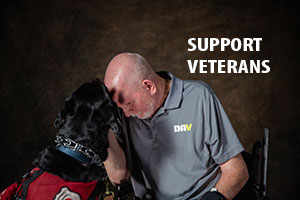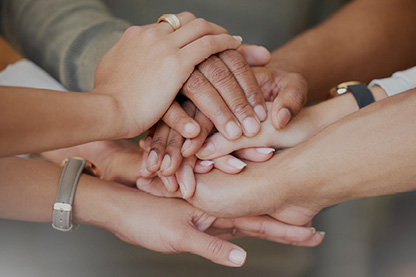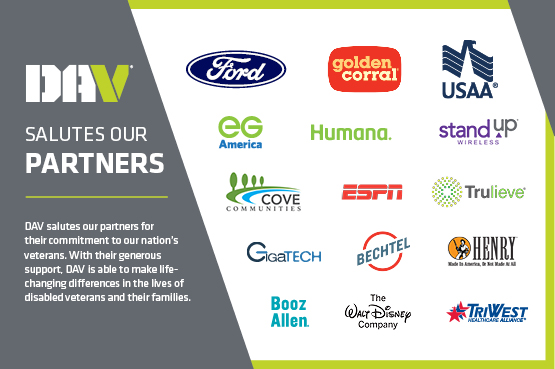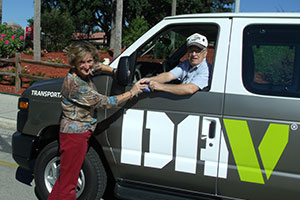One of Us
In 2005, Sharon Herron transitioned from male to female. In 2017, she first set foot into Livonia, Michigan’s DAV Chapter 114, where she found a place to belong.
There are an estimated 1 million veterans who identify as lesbian, gay, bisexual, transgender and queer, and these veterans can face increased health risks and unique challenges in accessing quality health care. Many of these veterans receive care at the Department of Veterans Affairs, but others may be unaware of what services are available or have concerns about discrimination. The VA is working to be a national leader in health care for LGBTQ+ veterans and wants to assure that high-quality care is provided in a sensitive, respectful environment at all VA health care sites nationwide.
What is VA’s policy on LGBTQ+ veterans?
The VA’s policy is that all veterans deserve respect and dignity. VA has a nondiscrimination patient care policy that includes sexual orientation and gender identity and expression. Specifically, it is the policy of VHA “…that staff provide clinically appropriate, comprehensive, veteran-centered care with respect and dignity to enrolled or otherwise eligible transgender and intersex veterans, including but not limited to hormonal therapy, mental health care, preoperative evaluation and medically necessary post-operative and long-term care following gender confirming /affirming surgery. It is VHA policy that veterans must be addressed based upon their self-identified gender identity… ” (VHA Directive 1341(2), May 23, 2018)
What services does VA provide for LGBTQ+ veterans?
Each VA facility is required to have an LGBTQ+ coordinator who can connect veterans with culturally competent providers, educate staff about where gaps in knowledge/training exist and to help create a more welcoming environment. (VHA Directive 1341(2), May 23, 2018)
The VA is authorized to provide:
- Hormone treatment
- Substance use/alcohol treatment
- Tobacco cessation treatment
- Treatment and information on prevention of sexually transmitted infections/PrEP
- Intimate partner violence reduction and treatment of after effects
- Heart health
- Appropriate cancer screening, prevention and treatment
The VA is not authorized to provide gender confirming or affirming surgeries or reconstructive surgeries for cosmetic purposes. However, the VA does provide support letters for veterans who seek those surgeries outside the VA, and will work with the surgeons to provide letters that help make that individual qualified to get those surgeries.
What can LGBTQ+ veterans expect when accessing their earned benefits?
All veterans—including gender and sexual minorities—deserve and can expect to be treated with dignity and respect when working with DAV benefits advocates on their claims. VA states that it is likewise committed to ensuring it honors the service of all veterans by providing the care they need without discrimination.
It is important for LGBTQ+ veterans to let providers know about sexual activity and identity so they can appropriately screen them for potential medical issues. Additionally, VA providers may ask about sexual orientation, gender identity, sexual health and social experiences, which may include exposure to violence in the home or homelessness. This information can help providers guide veterans to resources, services and programs that can address their unique needs.
LGBTQ+ veterans can be assured their providers will keep any information they reveal confidential. They can ask that their gender identify or sexual orientation not be revealed in their medical record although this may compromise their ability to receive appropriate care.
The VA has also committed to a zero tolerance policy around harassment and assault within the VA health care system. Learn more about that policy here.
Where can a veteran learn more?
Veterans can utilize no-cost DAV benefits advocates to learn more about available veterans benefits, programs and services. Additionally, DAV’s legislative team is dedicated to advancing equity in health services and benefits for underserved and minority veteran populations, including LGBTQ+ veterans. Learn more about DAV’s critical policy goals here. More information on the VA’s LGBTQ+ veterans policies and programs can be found here. The VA has also made available the following fact sheets to identify health care topics for sexual and gender minorities:
- VA Health Care for Transgender Men
- VA Health Care for Transgender Women
- VA Health Care for Gay, Bisexual and Queer Men
- VA Health Care for Lesbian, Gay, Bisexual and Queer Women
Definitions:
Cisgender: A person whose gender identity matches the sex they were assigned at birth.
Transgender man: An individual who is classified as female at birth, but who identifies as male (regardless of whether gender reassignment surgeries have occurred). Use appropriate pronouns for men—he, his, him.
Transgender woman: An individual who is classified as male at birth, but who identifies as female (regardless of whether gender reassignment surgeries have occurred). Use appropriate pronouns for women—she, hers, her.
Gender: Behavioral, cultural, or psychological traits that a society associates with birth sex or gender expression.
Gender expression: External display of one’s gender (such as dress and behavior) usually consistent with gender identity
Gender identity: How an individual identifies with a gender category (male, female or gender-nonconforming)
Gender nonconforming: An individual who does not identify as either male or female (use gender-neutral pronouns such as “they” or “them” or ask the veteran for preference).
Pronouns: Pronouns (he/him/his, she/her/hers) convey gender information and are a means of gender expression. Growing numbers of people, including some transgender and gender nonconforming people, use they/them/their as a gender-neutral singular personal pronoun. If you do not know a person’s pronouns, use gender-neutral pronouns or ask what pronouns the person uses.
Intersex: Individuals born with reproductive or sexual anatomy and/or chromosome pattern that does not fit typical definitions of male or female birth sex.
Confidential crisis support
If you or a veteran you know is in crisis, call the Veterans Crisis Line now: Dial 988 then press 1, or visit veteranscrisisline.net. You can call, text or chat online with caring, qualified VA responders. Many of them are veterans or family members of veterans.








